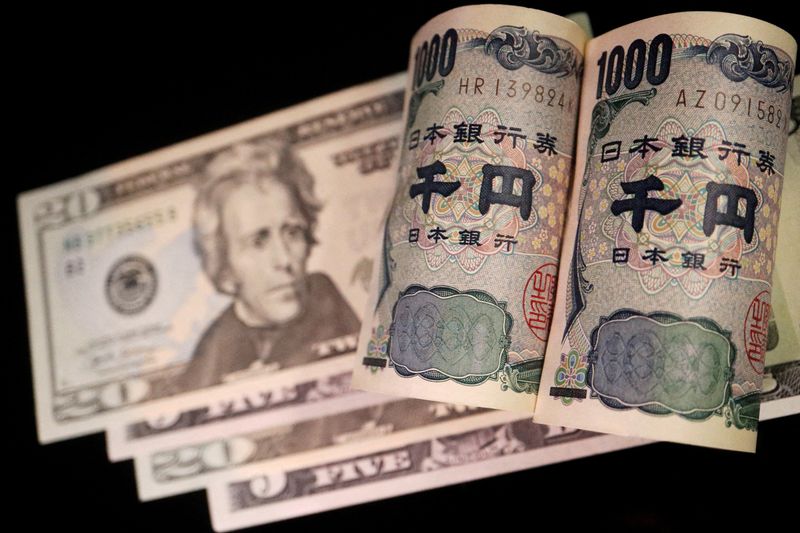 © Reuters. FILE PHOTO: Banknotes of Japanese yen and U.S. dollar are seen in this illustration picture taken September 23, 2022. REUTERS/Florence Lo/Illustration/File Photo
© Reuters. FILE PHOTO: Banknotes of Japanese yen and U.S. dollar are seen in this illustration picture taken September 23, 2022. REUTERS/Florence Lo/Illustration/File Photo
By Herbert Lash and Amanda Cooper
NEW YORK/LONDON (Reuters) -The yen tumbled to a four-month low on Tuesday after the Bank of Japan's momentous, widely anticipated decision to end its negative interest rate policy, while the dollar strengthened ahead of the Federal Reserve's latest outlook for rates.
In a historic shift from decades of massive monetary stimulus, the Japanese central bank ended eight years of negative interest rates and other remnants of unorthodox economic policy after a two-day meeting of policymakers.
As most investors had already priced in a change, the yen dropped more than 1%, weakening in U.S. trading hours to 150.96 to the dollar after the news.
The yen was last down 1.19% at 150.91 to the dollar. Against the euro, the Japanese currency similarly slid 1.1% to 163.99, also its weakest in four months.
"They're very much in favor of trying to normalize the way the money market and the financial system work locally," said Brad Bechtel, global head of FX at Jefferies in New York. "I think they've done a lot of big steps to get there."
With Japan's first rate hike in 17 years, the BOJ said it would guide the overnight call rate - its new policy rate - in a range of zero to 0.1%, adding it expected "accommodative financial conditions" to be maintained for the time being.
That is likely to keep pressure on the yen, as U.S.-Japanese rate differentials remain stark. It will also attract foreign investment into Treasury bonds and keep the dollar strong.
"The market has taken it as a green light to increase the short yen positioning that was already in place, given the forward guidance from the BOJ was fairly cautious, and not really enough to draw further hawkish repricing in the Japanese rate market," MUFG currency strategist Lee Hardman said.
DOLLAR DOMINANCE
This week's raft of central bank decisions are dominating action in the currency market, headlined by the Fed.
The U.S. central bank will deliver its policy outlook on Wednesday, when it is widely expected to keep rates unchanged at 5.25% to 5.50%. The market is awaiting clues on the likely course of monetary policy through policymakers' economic projections for this year through 2026.
"Anytime the Fed and the BOJ are moving policy settings at about the same time, it's always the Fed that rules and dominates the price action, even in dollar/yen," said Gareth Berry, Macquarie's FX and rates strategist.
"So the BOJ's decisions generally are, as far as the yen is concerned, a matter of secondary importance."
The dollar index, which measures the performance of the U.S. currency against six others, is around its highest in two weeks, up 0.33% on the day at 103.90.
Recent data showing a resilient U.S. economy has suggested inflation is still sticky enough to deter the Fed from cutting rates too much or too quickly this year, which has boosted the dollar.
The Australian dollar dropped after the Reserve Bank of Australia (RBA) left rates unchanged on Tuesday, as expected, but watered down its guidance over the likelihood of further rate hikes.
The Aussie slid 0.85% to an almost two-week low of $0.6504, dragging the New Zealand dollar down 0.5% to $0.6055.
Elsewhere, a broadly stronger dollar pushed the euro and sterling to two-week lows.
The euro was last down 0.08% at $1.0863, while sterling fell 0.2% to $1.2723.
In cryptocurrencies, bitcoin fell as much as 7% to skim two-week lows, after last week's record highs triggered some profit taking.
Bitcoin, the largest cryptocurrency by market value, was last down 4.07% at $62,624.

